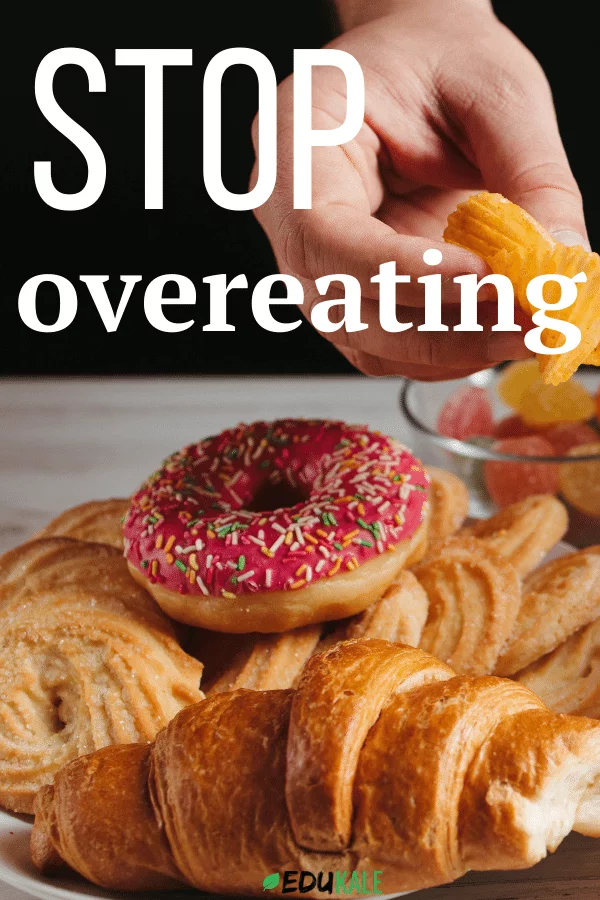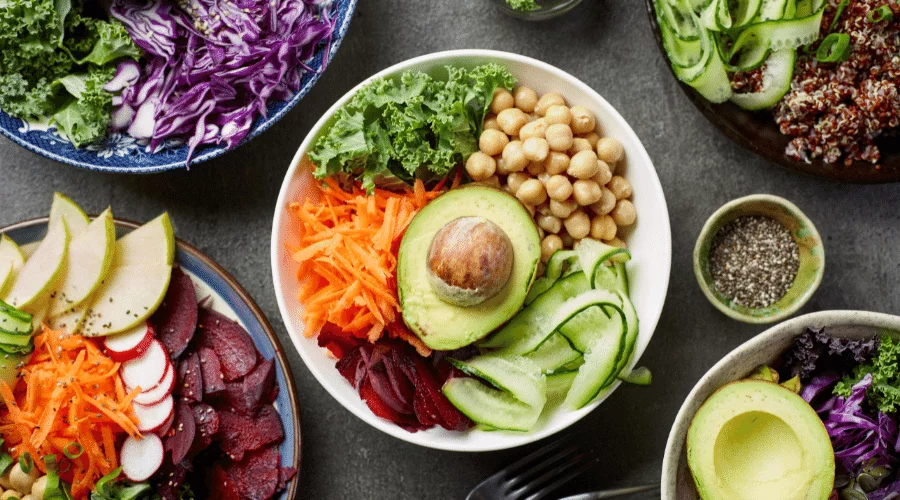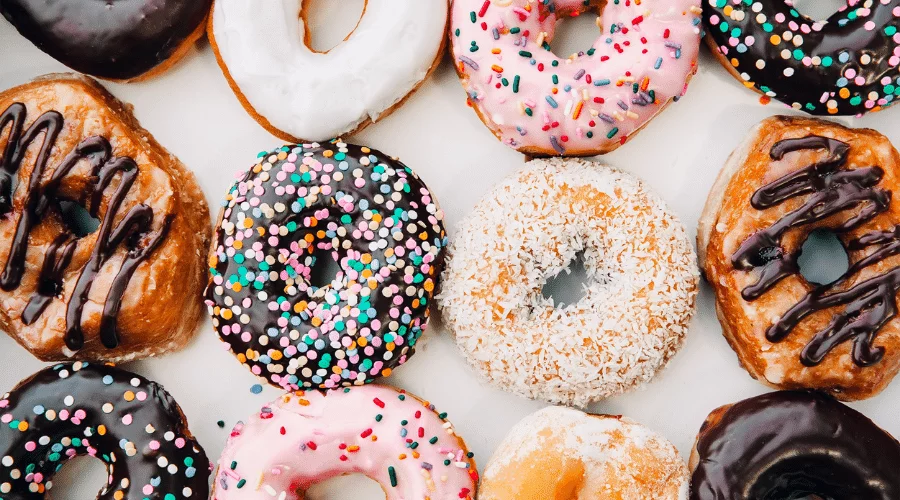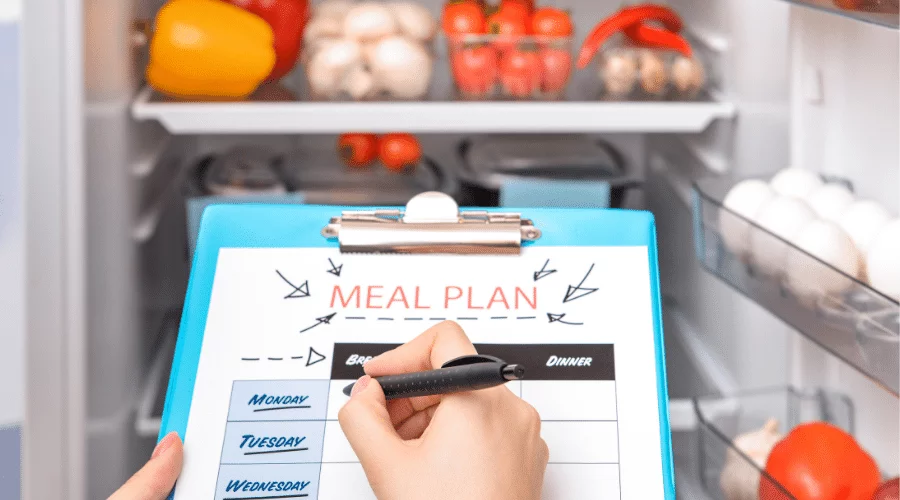Written by Lucie Villeneuve, nutritionist, M.Sc.
Overeating means eating past your body’s actual needs, and it can be rather uncomfortable. While overeating once in a while is not a problem, constantly eating beyond your needs can become an issue. So how can you stop overeating for good?

What are the signs of overeating?
The signs of overeating include consistently eating past the point of fullness, feeling very uncomfortable after a meal, and wishing you hadn’t eaten so much. Experiencing things such as nausea, abdominal pain, gas, bloating, etc are also common.
In short, you could be overeating because of 2 main reasons:
- You lack nutrition knowledge so you don’t know which portion size you should be eating
- You are stuck in diet culture/restricting which causes you to have the restrict-then-overeat pattern
If you’re #1, you really need to learn about nutrition, specifically calories, portions sizes, making balanced food choices, different macronutrients, etc. to get you started. My article on healthy eating for beginners can help, as well as my FREE healthy habits webinar.
If you’re #2, here’s what you need to be doing.
Eat full, healthy meals
The first and most important step is to actually give your body the nutrients it needs. Indeed, if you’re always overeating, chances are you’re not actually fueling your body correctly, which is causing you to overeat to get those nutrients.
Make sure that you’re also getting enough fiber which fills you up and keeps your gut healthy, and that you’re eating plenty of nutrient-dense foods, like whole grains, legumes, and fruit and veggies.
If you stick to three balanced and healthy meals a day and get in all of your macronutrients, little by little you’ll stop getting the signals to constantly overeat and you’ll be in a better place to actually trust your hunger/fullness cues. You’ll also be less likely to overeat processed foods if you’re already full from whole healthier foods.

Recognize your trigger foods
Recognizing your trigger foods that lead to overeating is important but it doesn’t mean banning them. It’s about identifying them in order to address them.
Try to ask yourself which foods can trigger a binge and why. In a lot of cases, it’s because you restrict them (see next point.) You can also read my article on fear foods here.
Lastly, remember that anyone, even with a wonderful relationship with food, will overeat if you put their favorite food right in front of them. So when it comes to your trigger foods it’s about finding the balance.
While you absolutely shouldn’t ban them, there’s also no need to have them sitting in front of you all day. Try to incorporate them into your meals as you would with any other food.
Remove restriction
It’s important to let go of your restrictions and regulations regarding food, and to give yourself permission to eat the foods that you like.
Giving yourself too many restrictions can cause you to feel unsatisfied emotionally, which will lead to overeating even if you’re satisfied physically. This is why it’s super important to cater to both types of hunger, physical and emotional. You can check out my article on that for more info.

Removing restriction doesn’t mean that you should have all of your favorite comfort foods all the time, but that you should incorporate them into your diet in moderation.
For instance, if you have a nice meal of lentils, sweet potatoes, and broccoli, and finish it off with a cookie, that will diminish your chances of eating the entire box of cookies after.
If no foods are off-limits and can be eaten as you pleased, you’re much less likely to go overboard with them.
Plan your meals
It’s one thing to think about eating healthy and balanced meals, but it’s another to actually plan and cook them after getting home from a long work day. This can lead to choosing junk food or takeout out of convenience, and then overeating.
If you’re not able to batch cook a few meals during the weekend, I really recommend at least planning your meal ideas. This will make things less overwhelming when it’s time to cook.

Practice mindful eating
When you’re overlooking your hunger and fullness cues, you’re much more likely to overeat.
It’s important to try eating more mindfully, which implies taking the time to think about the foods that you are consuming. Try to focus solely on the food you are eating, without any distraction. You should take the time to sit down at a table and chew each bite thoughtfully, noting the different aspects and tastes. This should implicate all 5 senses.
I recommend using the hunger and fullness scale which enables you to assess your hunger levels before and after your meals. This will help you be more in tune with your body’s signals and help prevent overeating. Here’s an article I wrote on the intuitive eating hunger scale if you want more information.
Tune in with yourself

Finally, dedicate some time and energy to tuning in with yourself.
Indeed, it’s also possible that overeating is a way to compensate for something else going on in your life. As humans, we’re very quick to turn to food to deal with certain life issues. And while that’s ok to an extent, it’s also important to figure out the actual cause in order to address it.
Are you stressed? Tired? Bored? Lonely? Are you feeling happy? Fulfilled? Are you dealing with strong emotions? Do you feel out of control in certain aspects of your life? What is your general health status like?
If you feel like you need help with this, check out my article on dealing with emotional eating!
Stop overeating in short
In order to stop overeating, you need to make sure that your meals are balanced and filling, that you are properly planning them, and that you are not restricting anything. It’s also helpful to eat mindfully and to make sure to tune in with yourself to address any underlying issues.
-Lucie

